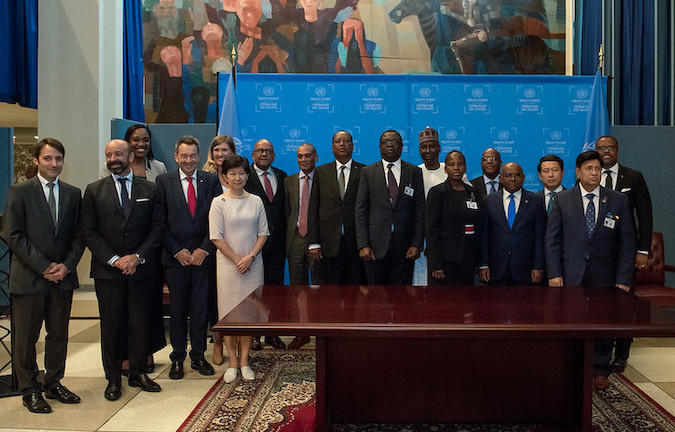By Jamshed Baruah
GENEVA (IDN) – “We need a strengthened, inclusive and renewed multilateralism built on trust and based on international law that can guide us to our shared goal of a world free of nuclear weapons,” said UN Secretary-General António Guterres, commemorating the International Day for the Total Elimination of Nuclear Weapons on September 26.
He was reiterating the resolve adoption of the General Assembly resolution in 1946, which committed the UN to the goal of ridding the planet of nuclear weapons. Because of these, “the world continues to live in the shadow of nuclear catastrophe”. [2020–09-27] ITALIAN | JAPANESE | RUSSIAN
In 1959, the UN General Assembly endorsed the objective of general and complete disarmament. In 1978, the first Special Session of the General Assembly Devoted to Disarmament further recognized that nuclear disarmament should be the priority objective in the field of disarmament.
Yet, as the Stockholm International Peace Research Institute (SIPRI) points out, around 13,400 nuclear weapons remain. Countries possessing such weapons have well-funded, long-term plans to modernize their nuclear arsenals. More than half of the world’s population still lives in countries that either have such weapons or are members of nuclear alliances.
While the number of deployed nuclear weapons has appreciably declined since the height of the Cold War, not one nuclear weapon has been physically destroyed pursuant to a treaty. In addition, no nuclear disarmament negotiations are currently underway.
At the same time, the doctrine of nuclear deterrence persists as an element in the security policies of all possessor states and many of their allies. The international arms-control framework that contributed to international security since the Cold War, acted as a brake on the use of nuclear weapons and advanced nuclear disarmament, has come under increasing strain.
On August 2, 2019, the United States’ withdrawal spelled the end of the Intermediate-Range Nuclear Forces (INF) Treaty, through which the U.S. and Russia had previously committed to eliminating an entire class of nuclear missiles.
Furthermore, the Treaty between the United States of America and the Russian Federation on Measures for the Further Reduction and Limitation of Strategic Offensive Arms (“new START”) will expire in February 2021. Should this treaty not be extended, as provided for in its articles, or expire without a successor, it will be the first time the world’s two largest strategic nuclear arsenals have been unconstrained since the 1970s.
On-site inspections under the New START, which were suspended in March due to the coronavirus, have yet to resume, and the next meeting of the Bilateral Consultative Commission (BCC), the implementing body of the treaty, remains postponed.
The U.S. has been sending contradictory signals.
According to the Washington-based Arms Control Association, the United States is studying how and when to resume inspections and the BCC while mitigating the risk of COVID-19 to all U.S. and Russian personnel. A State Department official said: “The United States continues to implement and abide by the New START Treaty.”
Also, reports said that the Trump administration has softened its demand that China immediately participate in trilateral nuclear arms control talks with U.S. and Russia and says it is now seeking an interim step of a politically binding framework with Moscow.
However, the administration continues to reject Russia’s offer of a clean five-year extension of the 2010 New Strategic Arms Reduction Treaty (New START) and has said that President Trump will not consider an extension until several conditions are met.
Trump administration officials insist that the framework with Russia must cover all nuclear warheads, establish a verification regime suitable to that task, and be structured to include China in the future.
Secretary of State Mike Pompeo said on August 31 that the United States is in “detailed discussions with them [Russia] on an arms control agreement” and that he hopes Washington and Moscow can “get that done before the end of the year.”
Following talks from August 17-18 in Vienna with Russian Deputy Foreign Minister Sergey Ryabkov, U.S. Special Presidential Envoy for Arms Control Marshall Billingslea pinned a potential extension of New START on Moscow fixing alleged verification flaws in the treaty and agreeing to the new framework.
“New START is a deeply flawed deal negotiated under the Obama-Biden administration,” said Billingslea during an August 18 press briefing. “It has significant verification deficiencies.”
According to Billingslea, these deficiencies include the absence of sufficient exchanges of missile telemetry and the limited frequency of on-site inspections.
Along with nuclear arms control, space security issues have an important role to play in negotiations on non-proliferation between the two countries. The rapid development of new space technologies, rivalries among the world’s big three space powers – the US, Russia, and China – has raised concerns over possible “weaponization” of the final frontier.
In his video address to the 75th UN General Assembly, Russian President Vladimir Putin promoted the idea of signing a deal that would help Moscow and Washington avoid the armed conflict in outer space.
“Russia is putting forward an initiative to sign a binding agreement between all the leading space powers that would provide for the prohibition of the placement of weapons in outer space, threat or use of force against outer space objects,” Putin said.
Commenting on Putin’s address, Chinese Foreign Ministry spokesman Wang Wenbin pointed out that Beijing and Moscow had submitted draft agreements on arms control in outer space. He accused the US of obstructing talks aimed at banning militarization of outer space.
The Chinese official expressed Beijing’s growing concern that the U.S. is determined to ensure space dominance through the creation of air force and space commands and intensification of the militarization of outer space. [IDN-InDepthNews – 27 September 2020]
Photo: Signing and ratification of Nuclear Ban Treaty ceremony on 26 September 2019 with participants and speakers. Credit: ICAN.




